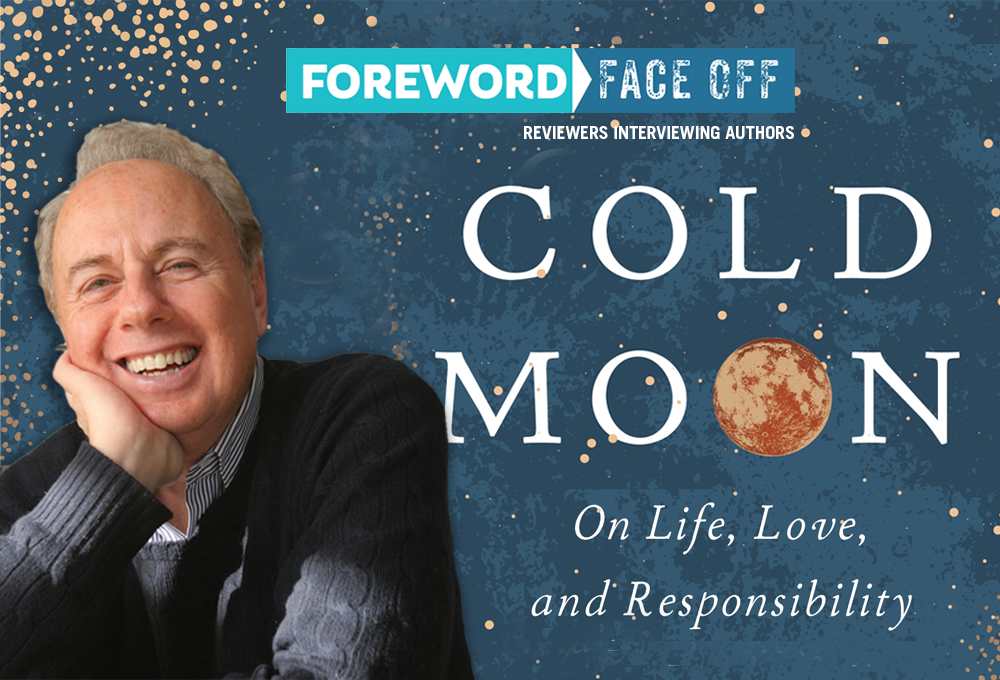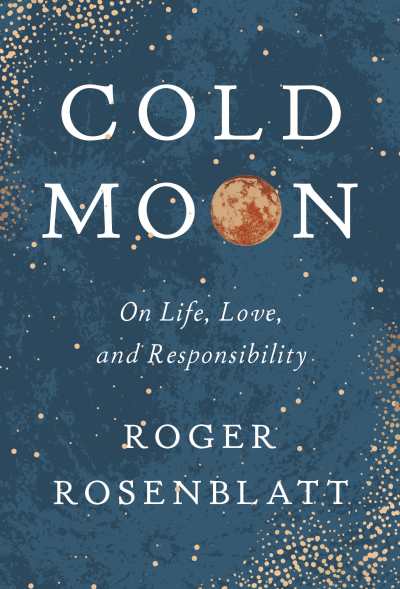Reviewer Matt Sutherland Interviews Roger Rosenblatt, Author of Cold Moon: On Life, Love, and Responsibility

As of this moment, the unfolding ballot-counting drama is riveting—and torturous—for Republicans and Democrats alike. Alas, there’s nothing left to do but watch and perhaps, pray, if you’re so inclined.
This week’s interview was chosen specifically to offer a diversion from the wretched suspense.

You might recognize the name Roger Rosenblatt for his lengthy career as a columnist for Time magazine. He’s also an award-winning playwright and the author of fourteen acclaimed books. His work has been described by William Safire in the New York Times as “some of the most profound and stylish writing in America today,” with “unparalleled elegance and wit,” according to the Philadelphia Inquirer. To be sure, this is the kind of guy we need to hear from today.
On the occasion of the release of his new book, Cold Moon—reviewed here by Matt Sutherland for the November/December issue of Foreword Reviews—we reached out to Turtle Point Press to set up this conversation.
Oh, and one last bit of business: We’ve just released a survey to help us better understand your needs as a librarian, bookseller, publisher, author, or avid reader. If you received an email invitation to the survey, please take a minute to fill it out. Or, here’s a link:
https://www.surveymonkey.com/r/forewordftw2020
Matt, take it from here.
First of all, it’s impossible to overstate the sheer amount of joy and fun in Cold Moon. It’s such a treat to come across a project like this. So, as you laugh and leap into your ninth decade, tell us how you maintain your infectious joie de vivre?
Interesting that you say “joie de vivre” because the phrase always sounds more light-hearted than it is, or than I think it is. The idea that there is joy in life, that in fact, joy permeates life, takes some close inspection. The first thing a writer learns is to make the reader see, which logically requires that the writer sees first—sees deeply, carefully, creatively, and expansively. Life is worth looking at, to put it mildly, and the more one sees, the more one marvels—at the cruelty and stupidity, as well as at the loveliness. The wonder is that no matter what one is seeing or feeling, including grief, beauty insists on its presence. Beauty intrudes. There is no distance at all between the awareness of beauty and the experience of joy. Joy at being alive. Joy in life. Joie de vivre.
After several tense months, many of us feel strung out by the news of the day, as if we’re peeping out from under a heavy set of covers in bed, afraid of what the next hour, day, week, may bring. Please help us buck up. Why is it important that we not let the discouraging news of pandemics, politics, economics, global warming, or anything else get us down?
I wouldn’t presume to tell people how to buck up when they’re feeling down. And if ever there were a time for the world to feel down, we’re in it now. I’m not even sure that the long view of history helps. The Black Plague in Europe lasted 300 years. Feeling better? What I can say—picking up from my previous answer—is that if one is intent on observing life, even during life’s more dismal moments, the intellectual or artistic state of mind inevitably replaces sorrow. Replaces helplessness, too. I’m weird in many ways, and one of them is that I run toward trouble instead of standing still or running away from it. That instinct is hardly virtuous. I simply wonder first what happened, and then, as a distant second, if there’s something I can do about it.
Very early in Cold Moon, you make plain what matters to you—in a sense, what matters most in the world—and the type of journey you’re asking readers to take with you: “Better to know where to go than how to get there. I wander from thought to thought, having learned but three things from my Long Night’s Moon: I believe in life. I believe in love. I believe we are responsible for each other.” I’m assuming you discovered those three beliefs later in life, but should you have discovered them earlier, at say, twenty, how would you have lived differently for the past sixty years?
I probably did discover these things in my twenties. So did you. But in our twenties (and thirties, and forties), we feel too self-important and self-aware to grasp the significance of what’s outside us. I tell my memoir-writing students, your memoir is not about you. It’s about the world you observe and consider. And it’s about other people. Everyone suffers the same sadnesses, mishaps, and tragedies. But only you see the world differently, even uniquely. Give your reader that intelligence, which often becomes true vision.
In my twenties and earlier, I was interested in girls, baseball, basketball, and jazz piano. Wisdom accompanies incapability. I remain interested in jazz piano.
Robert Conquest wrote that “cultures turn rotten” when the “kindred themes” of knowledge and art lose their equal and important role in society. I don’t need to rehash all the ways science is currently being undermined and funding for the arts is a constant, mostly losing, battle. Please explain to us why you say, “the conjoining of scientific and artistic exploration … gives us the endless sky.”
I’m really not sure of what I meant by that. Maybe just the expression of being thrilled by all knowledge, artistic and scientific. As a science ignoramus, I go wild at learning anything new. In Cold Moon, I talk about Microchimerism, a miraculous process of which I learned from an old friend’s book. At conception, the baby’s cells and the mother’s engage in a transaction, a kind of conversation, so that each bears the cells of the other. The child carries those cells past birth into life, in all its major organs, including the heart. The mother preserves those cells and uses them in successive births. Thus, the first child eases and strengthens the lives of the second and third.
When I first heard the Bach Three, or Bill Evans, or Miles, or Sarah Vaughan, or saw Vermeer’s “Woman Holding a Balance,” or Van Gogh’s “Mulberry Tree,” or watched Gregory Hines tap dance, or Fred Astaire create one swirling breathtaking figure of himself with Rita Hayworth, there was the same ecstasy as discovering Microchimerism. Art and science, each produced by people’s infinite capabilities. A ride in the endless sky.
When I was writing about a political convention in Dallas working for Time magazine, a group of journalists were being given a tour of the book depository where Lee Harvey Oswald positioned himself to kill JFK. At the entrance to the building was a huge glass wall. A man, not seeing the glass, and thinking that the space was open air, walked straight into it, shattering the glass all over and around him. People reasonably gasped, and recoiled. I, unreasonably, moved toward the man at once, and did my best to cover his wounds till he could get real help. I’m no hero. I went toward to poor fellow first, because I wanted to see what had happened.
If you want to climb out of the pits, concentrate on the pits.
You love to wander the streets around your home in Manhattan. “Making my way around the city, I sometimes think I am sleepwalking because of my dreams. Sometimes not. When I’m certain I am dreaming, it turns out I am not. Occasionally, I dream within a dream. … That inner dream is the one you never remember, the secret dream. It frightens you the most, but maybe it shouldn’t. The dream tells you what it wants you to know.” Let’s wrap this up with some mystery and wonder. How can we nurture our inner mystic, nurture a life of courage and imagination, as well as a belief in miracles and magic—and why is it important that we do so?
When I was a kid I pretended I was a private detective, and I went around solving every crime I could find or invent. When I grew older, the idea of mystery expanded, and I learned that the most compelling mysteries resisted resolution. Art gives shape to irresolution. But most of life still remains an unsolved mystery. Why you do something. Why you don’t. What you smile unconsciously at. Why you burst into tears. Keats said, “dwell in the mystery.” Meaning, don’t deny it or resist it. Embrace all that we do not and cannot and will never understand.
I believe in God every other day. And on those days when I believe, I am trusting in pure mystery. If God made us, and tossed us into the universe, with a parting “Good luck,” it suggests that God did not wish to be understood. So faith replaced understanding. I do not always have faith in God, but I never lose faith in the mystery.
Here’s an example of what I mean. Each time I attempted to type the word “faith” in that last sentence, my iPad substituted the word “daughter.” Our daughter died twelve years ago at age thirty-eight, and I never stop thinking about her, even when I am unaware that I am thinking about her. So she suddenly appears where I mean to write “faith.” And I am at once shocked, saddened, and made glad by her appearance. Dwell in the world’s mysteries. There’s no place like home.
Matt Sutherland
